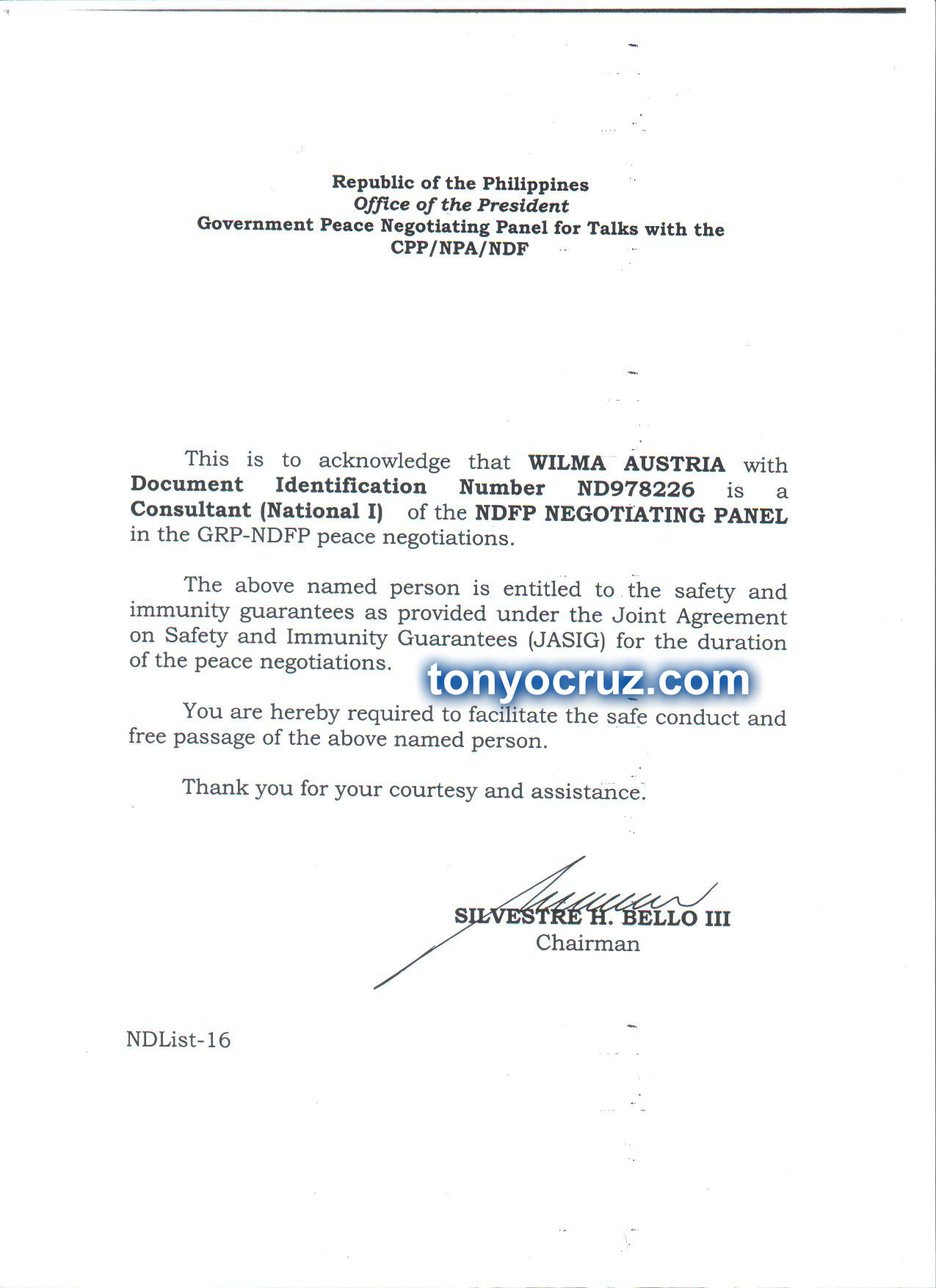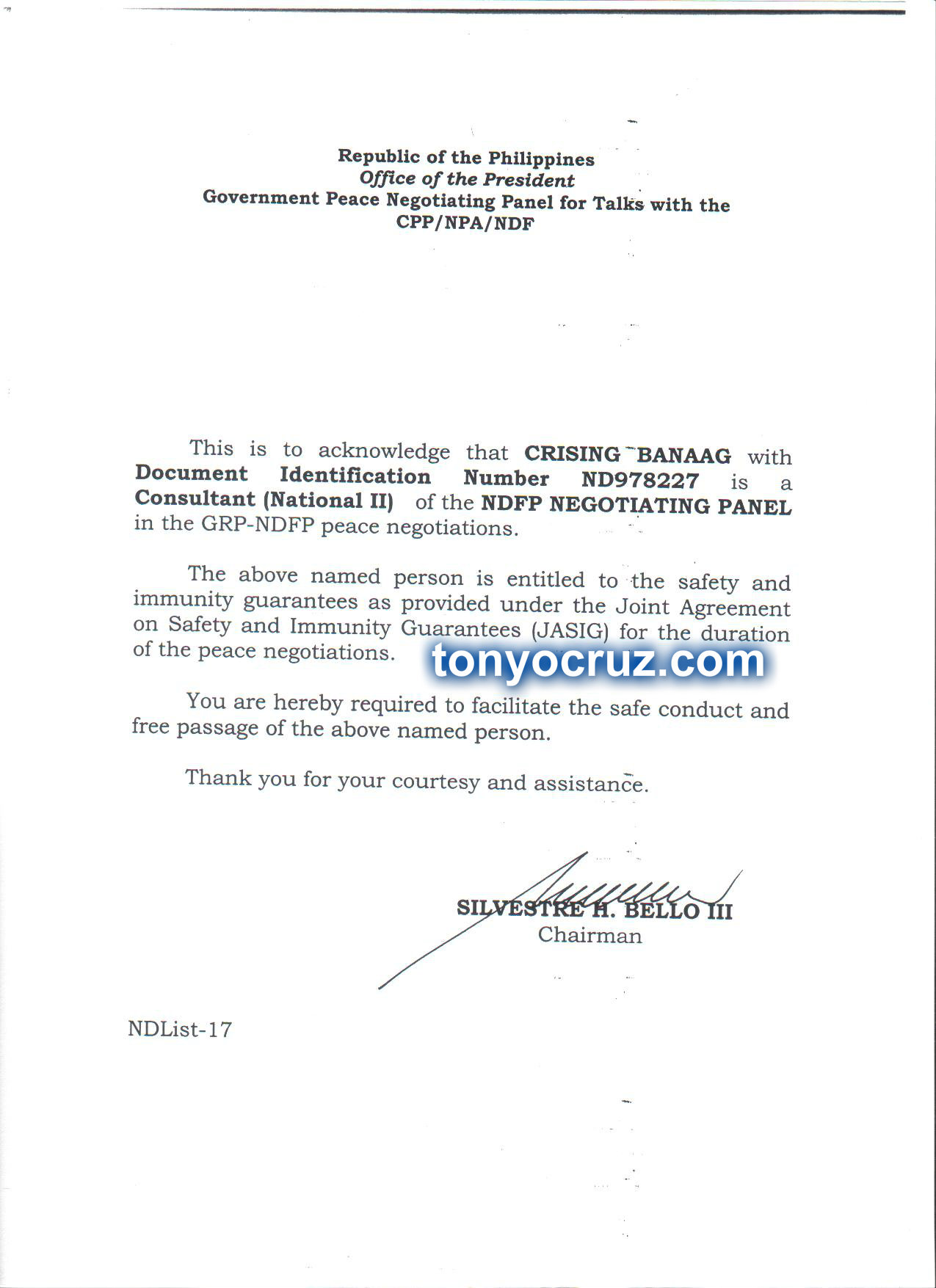
If you care about peace, and would like to see the peace talks between the government and the communist rebels to resume, this post is for you — as well as my column today at the Manila Bulletin.
The formal peace negotiations between the Government of the Republic of the Philippines (GPH) and the National Democratic Front of the Philippines (NDFP) started anew under President Fidel V. Ramos in the mid-1990s.
In 1994, while the GPH and NDFP were both busy propelling the talks, the GPH forces captured the NDFP’s Wilma Austria. Then-President Fidel V. Ramos visited her in detention and ordered her release, along with several other political prisoners.
The first major agreement between the GPH and the NDFP was the The Hague Joint Declaration, signed on 1 Sept. 1992, which laid down the basis (to resolve the armed conflict), goal (attain a just and lasting peace), basis (common principles of sovereignty, democracy and social justice), and recommendations on how to move forward (goodwill measures such as releasing political prisoners and, more importantly, a logical four-point agenda).
Learning from the military’s surveillance of communist negotiators in the 1986-1987 peace talks, both signed the Joint Agreement on Safety and Immunity Guarantees (JASIG) to ensure the widest latitude of freedom for panelists, consultants, staff and other participants in the talks.
President Ramos took an extra step by signing Executive Order 276 creating a permanent committee to implement JASIG:
The JASIG provides that each party identify through a Document of Identification a total of 85 panelists, consultants and staff, while the other party would acknowledge each with a Letter of Acknowledgment.
Austria, Tiamzon: Duly-identified NDFP consultants, duly-acknowledged by GPH since 1995
In 1995, the NDFP chief negotiator issued Documents of Identification to its panelists, consultants and staff, and the GPH chief negotiator promptly issued Letters of Acknowledgement for each of them.
Among those issued Letters of Acknowledgment by then GPH chief negotiator Silvestre Bello III were Wilma Austria

and Benito Tiamzon, under the assumed name “Crising Banaag”

Flash forward to 2014: The GPH forces recently arrested and detained Austria, Tiamzon and their companions, somewhere in Cebu. Military and civilian officials of the GPH continue to ignore the fact that both Austria and Tiamzon hold DOIs and LOAs.
The GPH claims that Tiamzon is the chairperson of the Communist Party of the Philippines, while Austria is the secretary-general. If we believe those claims that they are the highest officials of the CPP, then it is only logical to assume that they are participants to the talks as consultants to the CPP’s representatives in the talks, the NDFP negotiating panel.
Honoring agreements is important
If the GPH is serious in the peace process and in respecting the agreements it negotiated and signed with the NDFP, including JASIG, both Austria and Tiamzon should be released and allowed to participate fully in the peace process. Ditto for the many other NDFP-identified and GPH-acknowledged consultants now languishing in jails and charged in courts with invented, trumped-up charges.
Some argue that the GPH-NDFP talks have not borne fruit. This is not exactly true.
Both the GPH and the NDFP have negotiated and signed a total of 11 agreements. The most important of these agreements is the Comprehensive Agreement on Respect for Human Rights and International Humanitarian Law (CARHRIHL) which sealed the first of the four major agenda that both parties agreed to address.
CARHRIHL is a landmark agreement, according to many experts in law and peace processes, because it meant both the GPH and NDFP would be held accountable for their respective human rights records and for their conduct in the armed conflict, even as they simultaneously fight in the battlefield and talk peace in the negotiating table. Unfortunately, the GPH has refused to implement it and froze the operations of its counterpart secretariat in the Joint Monitoring Committee tasked to oversee its implementation.
If and when the talks resume, the GPH and NDFP would hopefully be tackling the next three parts of the agenda:
- Social and Economic Reforms
- Political and Constitutional Reforms
- Cessation of Hostilities and Disposition of Forces
Abandon the talks or give it a chance?
Unfortunately, there are some who just wish that the communists would just surrender, or harbor the wet dream of total victory by the Armed Forces of the Philippines over the NPA. The latter has been the longest-held fantasy porn plot of the military, dating back to martial law.
What is plausible is that, without the talks, the GPH would continue to spend billions of precious taxpayer money for counter-insurgency programs that have so far yielded practically nothing in denting the fighting strength of the CPP, NPA and other member-organizations of the NDFP. According to publicly-available NDFP statements, its forces are now present in all regions of the country and more than 70 of the country’s 80+ provinces, with a growing membership, and expanding bases of operation.
It obviously does not help that the GPH, albeit bannering the Daang Matuwid slogan, is a cesspool of corruption, depravity, treason, lack of compassion for the poor and the middle class, favors the rich, and proudly defends its gross failure to smartly address our most basic problems. In my opinion, this kind of status quo under the GPH does the NDFP a huge favor and makes it an agent of change for people who give up on the system.
There is still hope though for this peace process, only if the GPH would respect the 11 agreements it has signed with the NDFP, release the NDFP consultants in accordance with the JASIG, and resume formal peace negotiations towards sealing deals on the three other major parts of the agreed agenda.
The GPH did it before under Fidel Ramos and Joseph Estrada. BS Aquino should give it a chance.